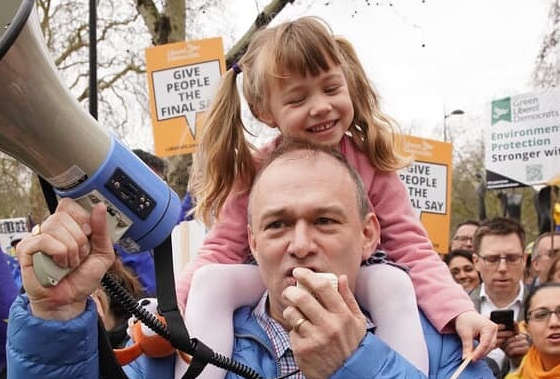When Britain last participated in a European Parliament (EP) election in 2019, Britons cast a massive protest against both the Conservative and Labour parties. Two protest parties – the anti-EU Brexit Party of Nigel Farage came first and the pro-EU Liberal Democrats came second. Together, they took 50 percent of the vote. The Conservatives, then led by Theresa May, came fifth with 9 percent of the vote.
The EP result was not replicated in the 2019 general election. Boris Johnson's pledge to get Brexit done led the Brexit Party to avoid nominating candidates in a big majority of seats, thus causing their vote to collapse. The Liberal Democrats campaigned as a potential party of government rather than a protest party and finished a weak fourth. The two protest parties saw their combined share of the vote drop by 35 percentage points.

Ed Davey, leader of the Liberal Democrats
The subsequent formal withdrawal of the United Kingdom from the EU meant that its parties did not compete in last week's 27-nation European Parliament election. Europeans gave more seats in the European Parliament to protest parties of the left and right than ever before.
Nigel Farage has returned with a vengeance to lead Reform, the anti-immigrant right-wing protest party. The Liberal Democrats have abandoned their claim to being a party of government and are offering voters another alternative to protest against both parties of government.
Currently, opinion polls are giving the two parties of government the combined support of no more than two-thirds of the electorate. This shows that there are plenty of protest voters still about. Since MPs are elected by a first-past-the-post vote in 650 constituencies, the impact of the two protest parties on seats in the House of Commons is likely to be very different.
The MRP analysis of Electoral Calculus forecasts that the Lib Dems have a good chance of winning more than 50 seats. This is because they offer South of England voters who want to protest against the government moderate candidates with a real chance of ejecting their local Tory MP.
Nigel Farage has failed seven times to win a seat in the House of Commons. Yet he has succeeded in moving the Conservative Party to the right by pushing David Cameron to concede the 2016 referendum that produced Brexit. Rishi Sunak hoped that his policy to send illegal immigrants to Rwanda would stop the Tories losing votes to Reform. This has not happened. The net effect is to take votes from right-wing Tories both in red wall seats in the North of England and blue wall seats in the South of England. This will deliver dozens of seats to the Labour and Liberal Democratic parties.
A disastrous Tory defeat will be followed by the election of a new Tory leader by surviving Tory MPs and party members who may want to protest against the Conservative leadership. If Nigel Farage finds he is eighth-time lucky and becomes the MP for Clacton he will appear as a leader who can attract millions of votes by offering right-wing Tory policies without being associated with the Conservative government during the past 14 years. This will open up a new choice of who becomes the leader of Opposition protests against the policies of the Labour government.
Prof Richard Rose is Britain's senior election expert; he has been writing about British general elections since 1959.